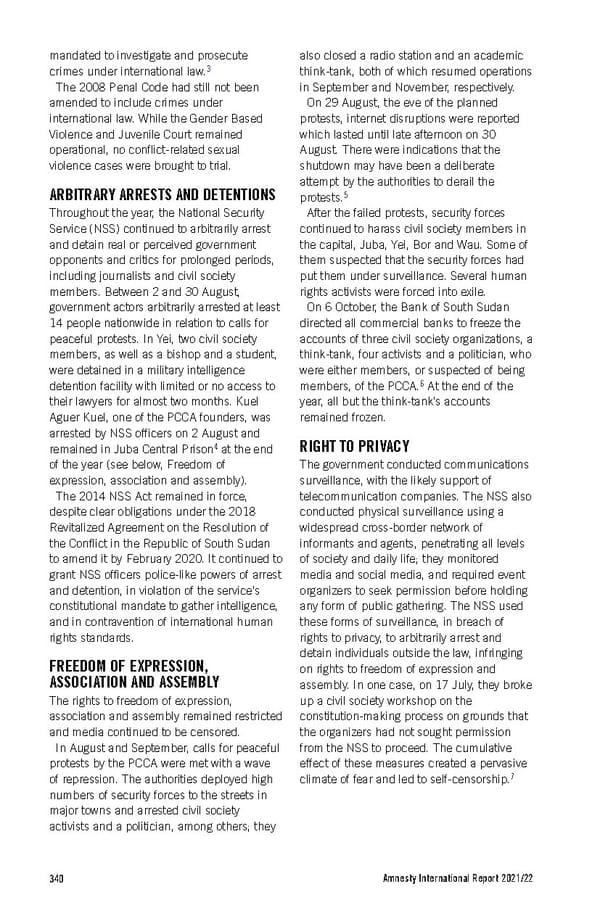mandated to investigate and prosecute also closed a radio station and an academic 3 crimes under international law. think-tank, both of which resumed operations The 2008 Penal Code had still not been in September and November, respectively. amended to include crimes under On 29 August, the eve of the planned international law. While the Gender Based protests, internet disruptions were reported Violence and Juvenile Court remained which lasted until late afternoon on 30 operational, no conflict-related sexual August. There were indications that the violence cases were brought to trial. shutdown may have been a deliberate attempt by the authorities to derail the ARBITRARY ARRESTS AND DETENTIONS 5 protests. Throughout the year, the National Security After the failed protests, security forces Service (NSS) continued to arbitrarily arrest continued to harass civil society members in and detain real or perceived government the capital, Juba, Yei, Bor and Wau. Some of opponents and critics for prolonged periods, them suspected that the security forces had including journalists and civil society put them under surveillance. Several human members. Between 2 and 30 August, rights activists were forced into exile. government actors arbitrarily arrested at least On 6 October, the Bank of South Sudan 14 people nationwide in relation to calls for directed all commercial banks to freeze the peaceful protests. In Yei, two civil society accounts of three civil society organizations, a members, as well as a bishop and a student, think-tank, four activists and a politician, who were detained in a military intelligence were either members, or suspected of being 6 detention facility with limited or no access to members, of the PCCA. At the end of the their lawyers for almost two months. Kuel year, all but the think-tank’s accounts Aguer Kuel, one of the PCCA founders, was remained frozen. arrested by NSS officers on 2 August and remained in Juba Central Prison4 at the end RIGHT TO PRIVACY of the year (see below, Freedom of The government conducted communications expression, association and assembly). surveillance, with the likely support of The 2014 NSS Act remained in force, telecommunication companies. The NSS also despite clear obligations under the 2018 conducted physical surveillance using a Revitalized Agreement on the Resolution of widespread cross-border network of the Conflict in the Republic of South Sudan informants and agents, penetrating all levels to amend it by February 2020. It continued to of society and daily life; they monitored grant NSS officers police-like powers of arrest media and social media, and required event and detention, in violation of the service’s organizers to seek permission before holding constitutional mandate to gather intelligence, any form of public gathering. The NSS used and in contravention of international human these forms of surveillance, in breach of rights standards. rights to privacy, to arbitrarily arrest and FREEDOM OF EXPRESSION, detain individuals outside the law, infringing ASSOCIATION AND ASSEMBLY on rights to freedom of expression and assembly. In one case, on 17 July, they broke The rights to freedom of expression, up a civil society workshop on the association and assembly remained restricted constitution-making process on grounds that and media continued to be censored. the organizers had not sought permission In August and September, calls for peaceful from the NSS to proceed. The cumulative protests by the PCCA were met with a wave effect of these measures created a pervasive 7 of repression. The authorities deployed high climate of fear and led to self-censorship. numbers of security forces to the streets in major towns and arrested civil society activists and a politician, among others; they Amnesty International Report 2021/22 340
 Amnesty International Report 2021/22 Page 339 Page 341
Amnesty International Report 2021/22 Page 339 Page 341